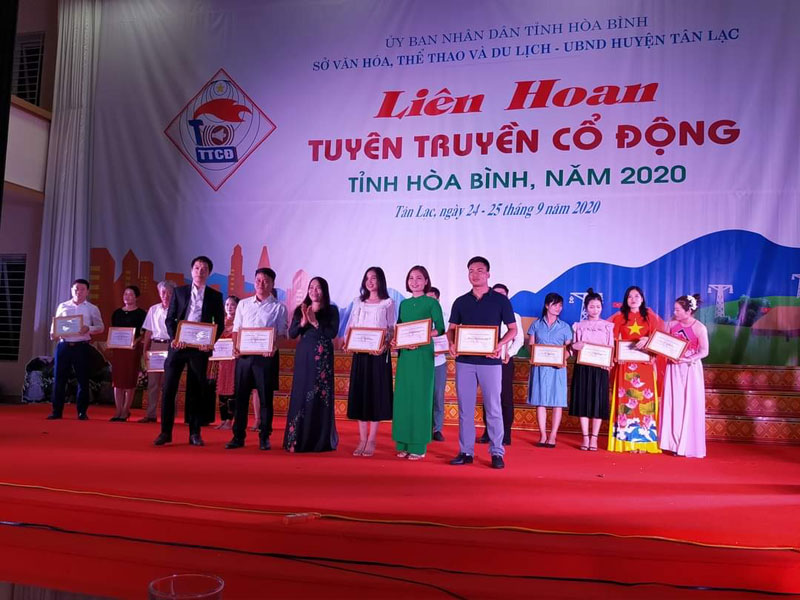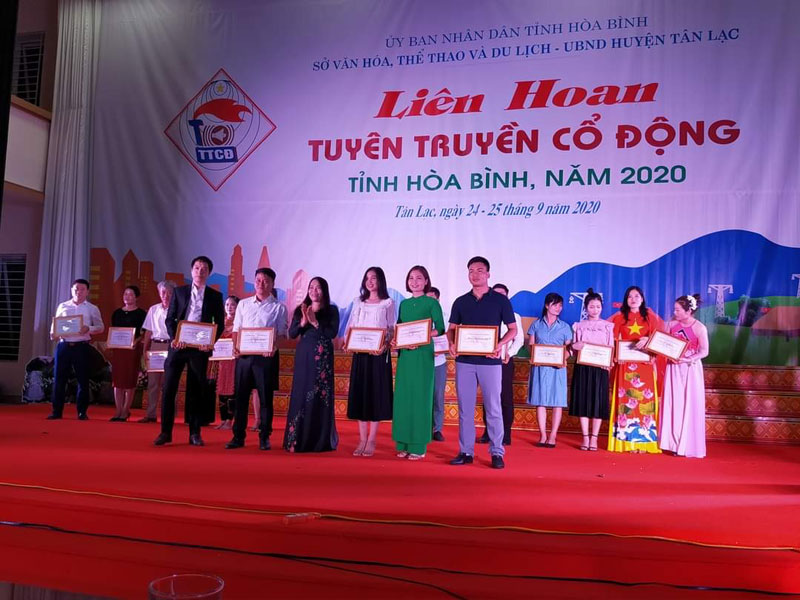
(HBO0 - The Department of Culture, Sports and Tourism of Hoa Binh province, in collaboration with Tan Lac district’s People’s Committee, organised a closing ceremony of a provincial dissemination festival in 2020 on September 25.
 Director of the provincial
Department of Culture, Sports and Tourism Bui Thi Niem presents awards to
outstanding works.
Director of the provincial
Department of Culture, Sports and Tourism Bui Thi Niem presents awards to
outstanding works.
Attending the festival
were more than 200 artists, communicators and artisans of 10 dissemination
teams of districts and city. Participating teams compete in four categories of
dissemination cars, display and description of topical photos, art performances
and skits welcoming all-level Party congresses, the 17th Party congress
of Hoa Binh province of the 2020-2025 tenure, and the 13th National
Party Congress.
During the two-day
event on September 24-25, participating teams entertained audience with
impressive performances.
According to the
organising board, the quality of entries was improved, with participating teams
having thorough investment in scripts, images, costumes and properties.
Outstanding performances include Tan Lac and Cao Phong districts’ dissemination
cars, Tan Lac district’s display and description of topical photos, Cao Phong
district’s "Ho so dep” (Good dossiers) skit, Lac Thuy district’s "Nguoi giu hon
Muong” (One who preserves Muong soul) skit, and Kim Boi district’s "Dang la
niem tin tat thang” (Party the trust of sure win) skit.
The organising board
presented 11 A prizes, 18 B prizes and 21 C prizes for outstanding works. Five
A prizes were also granted to Hoa Binh city, Tan Lac, Yen Thuy, Cao Phong and
Lac Thuy districts, and five B prizes to Mai Chau, Kim Boi, Da Bac, Lac Son and
Luong Son districts./.
With an increasingly vibrant and widespread emulation movement aimed at building cultured residential areas and cultured families, Yen Thuy District has been making steady progress toward improving both the material and spiritual well-being of its people, while fostering a civilized, prosperous, beautiful, and progressive community.
Once lacking recreational spaces and community facilities, Residential Group 2 in Quynh Lam Ward (Hoa Binh City) has recently received attention for the construction of a new, spacious, and fully equipped cultural house. The project followed the model of state support combined with public contributions in both labor and funding.
The "All people unite to build cultural life" movement, which has been effectively integrated with Kim Boi district’s socio-economic development goals, is fostering a lively spirit of emulation across local residential areas, hamlets, villages, public agencies, and enterprises. In addition, through the initiative, traditional cultural values are being preserved and promoted, while community solidarity and mutual support in poverty reduction and economic development are being strengthened.
A working delegation of the Hoa Binh provincial People’s Committee led by its Permanent Vice Chairman Nguyen Van Toan on June 11 inspected the progress of a project to build the Mo Muong Cultural Heritage Conservation Space linked to tourism services in Hop Phong commune, Cao Phong district.
Born and growing in the heroic land of Muong Dong, Dinh Thi Kieu Dung, a resident in Bo town of Kim Boi district, in her childhood was nurtured by the sweet lullabies of her grandmother and mother. These melodies deeply imprinted on her soul, becoming an inseparable part of her love for her ethnic group's culture. For over 20 years, this love for her hometown has driven Dung to research, collect, and pass down the cultural values of the Muong people to future generations.
In the final days of May, the Ethnic Art Troupe of Hoa Binh Province organized performances to serve the people in remote, mountainous, and particularly disadvantaged areas within the province. These were not just ordinary artistic shows, but they were the meaningful journeys aimed at spreading cultural values, enhancing the spiritual life of the people and contributing to the preservation of ethnic minority cultural identities.



 Director of the provincial
Department of Culture, Sports and Tourism Bui Thi Niem presents awards to
outstanding works.
Director of the provincial
Department of Culture, Sports and Tourism Bui Thi Niem presents awards to
outstanding works.